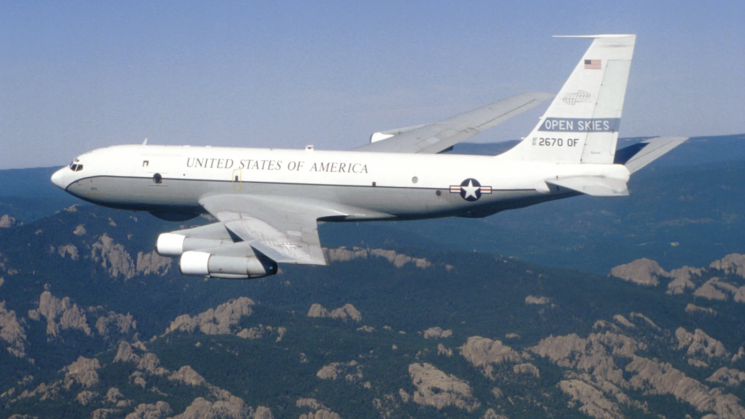- The Trump administration should reconsider its intention to withdraw from the Open Skies Treaty. The benefits of the treaty to the United States were highlighted by a series of eminent former U.S. officials, including President D. Eisenhower, President George H. W. Bush, U.S. Secretary of State George Shultz, U.S. Secretary of Defense William Perry, U.S. Secretary of Defense James Mattis and Senator Sam Nunn. Washington profits from this “military-to-military engagement tool” as it contributes to greater transparency and stability in the Euro-Atlantic region. While the intelligence and confidence building advantages are limited for the United States itself, they are very real for America’s NATO Allies. The strategic benefits to the U.S. of “stability in the Euro-Atlantic region” are also very real. Moreover, the political symbolism matters: U.S. withdrawal would prevent the United States from overflying Russia but would leave Russia still able to overfly American military activities and installations in Europe. U.S. departure would also further weaken the international arms control architecture and be a further blow to any global sense of stability.
- State Parties should return to full compliance with the treaty. We welcome the fact that a 19 February 2020 U.S.-Estonian-Lithuanian flight over Kaliningrad took place. State Parties should remove all restrictions that they have unilaterally imposed on Open Skies flights. We thus call on all parties to refrain from restricting the total distance of observation flights or prohibiting overflight over certain territories. State Parties should also pursue a status-neutral approach to ensure the resumption of unrestricted flights between Russia and Georgia. In particular, parties should give consideration to the provisions on the implementation of status neutral CSBMs, included in the 1993 OSCE document on Stabilising Measures for Localised Crisis Situations. The document’s section on ‘Measures for Monitoring of Compliance and Evaluation’ deserves particular attention.
- European State Parties should make every effort to remain in the treaty, even if the United States withdraws. The treaty continues to add value to its signatories, even if the United States decides to leave. NATO’s Secretary General and Russia both agree that the treaty serves all parties well and should be preserved. Russia and Belarus aside, remaining European parties perform 55% and receive 58.9% of all overflights. Russia and Belarus conduct 87% of their flights over other European states and Canada. European parties often have their own Open Skies planes, some of which are in midst of modernisation today. Moreover, the flights gather unique data. Most European governments do not possess space-based reconnaissance capabilities comparable to the United States. At the same time, commercial satellites cannot collect intelligence comparable to that of an Open Skies overflight. Open Skies planes fly flexible paths, in contrast to satellites flying in fixed orbits. Where satellites cannot see through clouds, Open Skies planes fly beneath them. And data generated is authenticated under agreed standards. In an era of sophisticated digital manipulation, this provides strong unaltered evidence of violations of agreements or preparations for military operations. With their Open Skies data, signatories can make a credible public case to the entire international community on their findings. Europe thus clearly benefits from the treaty.
- Should the United States withdraw from the Open Skies Treaty, remaining State Parties must make a determined effort to consider its effect on the treaty. According to Article XV.3 of the treaty, if the United States withdraws, Canada and Hungary must convene a conference of the States Parties no less than 30 days and no more than 60 days after they have received a withdrawal notice. Parties should adopt a position of maximum flexibility. We recommend that:
-
- State parties should make every effort to hold this conference in a timely fashion, by considering holding the conference tele-remotely. If this is considered unworkable, the conference should be held as soon as conditions will allow;
- Remaining state parties should also satisfactorily address concerns that NATO member states could share data from overflights with the United States after it left the treaty.
- Remaining parties should maintain maximum flexibility to constructively address reallocation of quotas and the lifting of flight restrictions.
ENDS
Signatories:
- Ambassador Giancarlo Aragona, Former OSCE Secretary-General (Italy)
- General Heinrich Brauss, Former NATO Assistant Secretary-General for Defence Policy and Planning (Germany)
- General Vincenzo Camporini, Former Chief of Staff of the Air Force and Chief of Defence General Staff (Italy)
- Admiral Alain Coldefy, Former Admiral of the Navy and General Inspector of the Armed Forces (France)
- H.E. Mr. Espen Barth Eide, Former Foreign and Defence Minister (Norway)
- H.E. Mr. Anatoliy Grytsenko, Former Defence Minister (Ukraine)
- Admiral Juhani Kaskeala, Former Chief of the Defence Staff (Finland)
- General Sir John Chalmers McColl, Former NATO Deputy Supreme Allied Commander Europe (UK)
- General Klaus Naumann, Former Chief of Staff of the German Armed Forces and Chairman of the NATO Military Committee (Germany)
- General d’armée aérienne Bernard Norlain, Former Commander of Air Defence Command and Air Combat Command (France)
- Admiral Giampaolo Di Paola, Former Defence Minister (Italy)
- H.E. Ms. Elisabeth Rehn, Former Defence Minister (Finland)
- General Sir David Richards, Former Chief of Defence Staff (UK)
- The Lord (Peter) Ricketts, Former National Security Advisor (UK)
- General Vyacheslav Trubnikov, Former Director of the Foreign Intelligence Service (Russian Federation)
- Brigadier General Klaus Wittmann, Former Director of Academic Planning and Policy at the NATO Defence College in Rome (Germany)
The original Article can be found @ELN






Leave a Reply